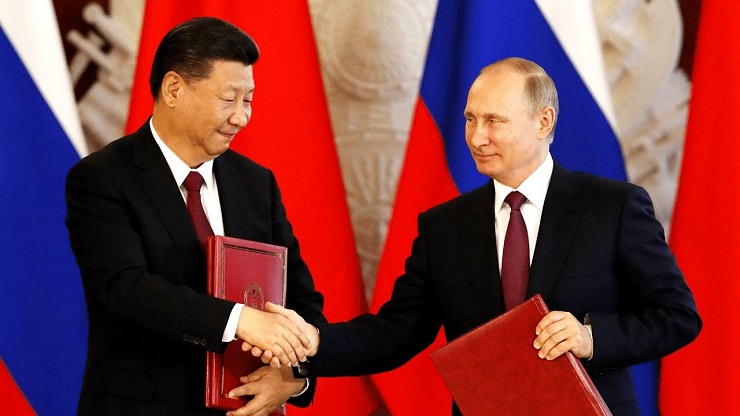When the US president Donald Trump recently invited Russia to participate in the G-7 summit and called his invitation an expression of ‘common sense’, he was not just intending to use the ‘Russia factor’ as a means to counter-balance Europe’s increasing assertiveness vis-à-vis the US over the G-7 summit and a host of other issues. The intention was equally to bring Russia into the ‘western fold’ to isolate China globally. Let’s not forget here that the various US official policy documents the Trump administration has released have repeatedly declared China as the biggest ‘threat’ the US is facing currently. Many top US officials strongly believe that China is the greatest threat. Therefore, if the ‘Chinese threat’ is to be countered, common sense would have Russia on the US side. Indeed, this is what some US allies think should be the US strategy to counter China. Dave Sharma, a pro-US liberal Australian MP, recently stated that the western allies need to bring Russia back to the ‘world’s most exclusive group of nations’ to “manage the rise of China.”
As it stands, not only is an actual US policy of ‘containment of China’ in place and that the US is actively seeking ways and means to materialise it by asking its allies to jump on the US bandwagon of ‘trade war’, but Russia is being coaxed into becoming a part of it as well. While the attempt has failed not only because of strong opposition from other G-7 members, including Canada, but Russia, too, has foiled this attempt by rejecting the US offer, calling it a “flawed idea.” Therefore, even if the US proposal had won some support from within the group, the fact this was a ‘trap’ against China would still have led Russia reject it.
This become pretty from the way Russia has actually responded. Beyond rejecting the offer, Russia has also made a counter-proposal. According to this, if the US does think that ‘common sense’ demands an expansion of the G-7, China, too, must be included along side Russia. Russia’s deputy foreign minister Sergei Ryabkov recently said that “Without China it’s simply impossible to discuss any issues in the modern world.” Interestingly enough, Russia’s potential rebuke came only a day after the US ambassador to Russia said that Washington was “engaged with the Russian Foreign Ministry and with the other G7 governments about whether there is an appropriate role for Russia at the G7”.
Russia’s counter-proposal to include China not only signifies how both countries have developed a common global strategic outlook, but also that this common outlook has already transformed into a strong mutual respect for each other’s national interests. Indeed, this was clearly the message that Xi conveyed to his Russian counterpart in a recent telephonic conversation. According to the details, Xi reaffirmed that China would “continue to work” with Moscow in “firmly supporting” each other’s efforts “rejecting external sabotage and intervention” so as to “preserve their respective sovereignty, security and development rights, and well safeguard their shared interests.”
The new template of ‘Sino-Russia alliance’ is deeply rooted not only in mutual understanding and respect for each other’s national interests—evident from Russian refusal to mediate India-China stand-off—but also in trade and economics. Apart from the fact that both powers engage in trade, the fact that there is, unlike the US-China trade ties, no massive trade imbalance between them means friction over economic issues is unlikely to disrupt their bi-lateral strategic ties. Bilateral trade between Russia and China increased 3.4% in 2019, amounting to US$110.79 billion, according to the Chinese Administration of Customs. Trade was well balanced, with Chinese exports to Russia increasing to 3.6 per cent and US$49.7 billion, while imports from Russia increased 3.2 percent to total US$61.05 billion.
Unlike the West, where the on-going constitutional reforms in Russia are being projected as Putin’s life-long plan for ‘authoritarian rule’, China came out supporting the reforms, calling it a people’s decision to choose their path of development. Chinese foreign ministry spokesman Zhao Lijian said that “as Russia’s friendly neighbour and comprehensive strategic partner of coordination for a new era, China will always respect the development path independently chosen by the Russian people and support Russia’s efforts to realise lasting stability and promote socioeconomic development.” Russia has obviously reciprocated by its open support for legislative changes introduced by China in Hong Kong.
“We respect the sovereignty and territorial integrity of the PRC and consider all issues pertaining to Hong Kong to be China’s domestic affair. We are against any attempts by external forces to interfere in relations between the central government and the Hong Kong Special Administrative Region of the PRC”, recently said Russian Foreign Ministry spokesperson Maria Zakharova.
Therefore, even if Washington’s calculation showed that Russia could be brought in to counter and isolate China globally, the series of events and Russia and China’s resolve to support each other show its high improbability. On the contrary, their support for each other’s core national interests and their resolve to work towards a new multilateral world order plus the way the US and Europe have increasingly fell apart shows that the US bid to place itself once again at the helm of global affairs unilaterally is bound to fail.
What is therefore evident is that the unipolar moment of US dominance is at an end already. Decades old cold-war policies and tactics are unlikely to pay dividends in a massively changed world of today.
Salman Rafi Sheikh, research-analyst of International Relations and Pakistan’s foreign and domestic affairs, exclusively for the online magazine “New Eastern Outlook”

